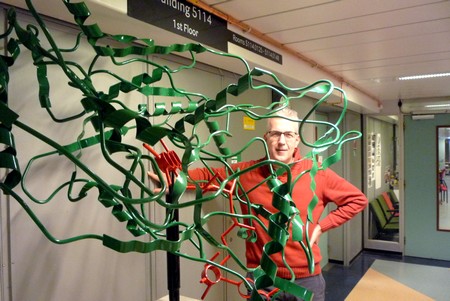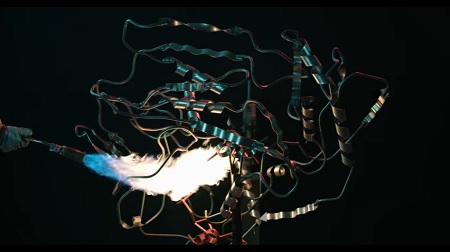ROBOX: new enzymes and nice film
His colleague Ben Feringa was recently awarded the Nobel Prize for Chemistry for his work on artificial molecular motors. Natural molecular machines, enzymes, are what University of Groningen professor Marco Fraaije is looking to improve, to make them suitable for use in industry. He has already improved a number of such enzymes in his work on the European research project ROBOX. A new - award winning - film explains the project.

Fraaije’s field is enzyme engineering, the targeted adjustment of enzymes. He studies the structure of these generally large proteins and seeks ways to improve them. ‘The ROBOX project is about making enzymes suitable for use in industrial projects’, he explains.
Fraaije commissioned a short film to illustrate what the ROBOX project is about. Alongside an explanation and images from the lab, we see an artist weld new parts to a complex structure. Biologists would soon recognize this as a complex protein. The model now stands in the corridor outside Fraaije’s office. ‘It’s not an exact representation, but it gives a good impression’, he explains.
More robust
Enzymes are natural machines that cause chemical reactions in the body. They therefore feel at home in water and at body temperature. ‘Industrial processes generally take place in other solutions and at a higher temperature’, Fraaije explains. But even in applications under ‘natural’ conditions, it would be useful if the enzymes were more robust: ‘They would then work longer, which would keep the costs down.’
In the ROBOX project, which is funded by the European Horizon2020 research programme, 19 partners (universities and industry) are working together to develop robust enzymes that can be used for oxidative reactions in industry. At present, high temperatures and heavy metals are required for this type of reaction. Enzymes would make the reactions greener and more specific.

Mutations
Fraaije’s job is to come up with modifications to make existing enzymes better suited to industrial use. ‘In ROBOX we have selected ten oxidation reactions for which we want to find an alternative using enzymes. We are right at the start of the process and are looking for the right enzymes.’ What is unique about Fraaije’s approach is that the required modifications initially come from a computer. ‘Once we know the structure of an enzyme, we can quickly work out the consequences of any modifications.’
The classical approach is to mutate the gene of a promising enzyme in more or less random places and then to screen many thousands of mutants in the lab. Fraaije makes an initial selection on the computer by calculating the effect of mutations. ‘We then choose about a hundred promising mutants to make and test in the lab.’ This dramatically speeds up the hunt for new, robust mutants.
The ROBOX project has been running for almost two years and for all ten reactions an enzyme has been found and modified. ‘Now it’s up to my colleagues in the project to see whether these meet all the requirements. If they don’t, they’ll come back to us for new modifications.’
What does a scientist find interesting about making enzymes for industry? ‘It’s about the relationship between the structure and function of an enzyme. Only if you understand that properly can you make robust enzymes. And that understanding is important when it comes to making new, useful enzymes.’ Apart from working on enzymes for industrial processes, Fraaije is also working on enzymes that could produce new antibiotics, for instance. ‘There is an oxidative enzyme that makes the bacteria that causes tuberculosis resistant. A better understanding of enzymes could help us do something about that.’
Prize
During the IFFR film festival in Groningen, the video on Enzyme Engineering made by Sensu about the research of Prof. Marco Fraaije won the prize for Best Groningen Film in the category Best Commissioned Film.

The ROBOX project (Expanding the Industrial use of Robust Oxidative Biocatalysts for the Conversion and Production of Alcohols) started almost two years ago, with a budget of about EUR 12 million. Marco Fraaije leads the Enzyme Engineering and Identification of Oxidative Enzymes ‘work package’, one of seven. He is also involved in the Process benchmarking & evaluation and Project Management work packages. The Groningen research is worth about EUR one million from the total budget. The general coordination is in the hands of chemistry business DSM.
| Last modified: | 12 March 2020 10.14 p.m. |
More news
-
16 April 2024
UG signs Barcelona Declaration on Open Research Information
In a significant stride toward advancing responsible research assessment and open science, the University of Groningen has officially signed the Barcelona Declaration on Open Research Information.
-
02 April 2024
Flying on wood dust
Every two weeks, UG Makers puts the spotlight on a researcher who has created something tangible, ranging from homemade measuring equipment for academic research to small or larger products that can change our daily lives. That is how UG...
-
18 March 2024
VentureLab North helps researchers to develop succesful startups
It has happened to many researchers. While working, you suddenly ask yourself: would this not be incredibly useful for people outside of my own research discipline? There are many ways to share the results of your research. For example, think of a...

